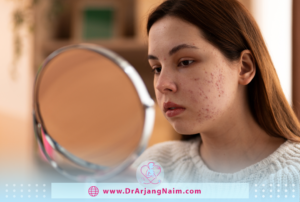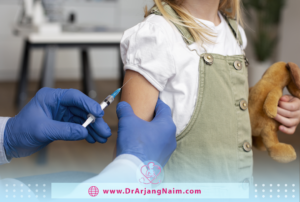Precocious puberty is when children’s bodies turn into adults’ bodies too soon. This change is known as puberty. Most of the time, puberty happens after eight years of age in girls and after nine years of age in boys. However, black, Hispanic, and Native American children may naturally reach puberty earlier.
During puberty, muscles and bones grow rapidly. The shape and size of the body change, and the body can have children.
The cause of precocious puberty often cannot be found. Rarely, certain conditions such as infections, hormonal problems, tumors, brain problems, or injuries may cause precocious puberty.

What is puberty?
Puberty is a period of rapid growth and development that marks the transition from childhood to adulthood. During this time, your body goes through a series of changes to reach sexual maturity, meaning your body becomes capable of reproduction. These changes are triggered by hormones released from the brain and sex organs. Here’s a breakdown of what happens during puberty:
- Physical Changes: When people hear puberty, most think of this. Boys and girls experience different physical changes, but some common ones include growth spurts, the development of breasts in girls and testicles in boys, and the appearance of body hair in the pubic area and armpits.
- Emotional Changes: Puberty isn’t just about physical development. It’s also a time of big emotional changes. You might experience mood swings, feel self-conscious about your body, or become more interested in romantic relationships.
Puberty’s timing can vary. It usually starts between ages 10 and 14 for girls and 12 and 16 for boys, but everyone develops at their own pace.

Signs
Symptoms of precocious puberty include:
- Pubic or underarm hair
- Rapid growth
- Testicular and penile growth, facial hair, and a deeper voice in boys
- Breast development and first period in girls
- Acne
- Adult body odor
What are the types of premature puberty?
This disease has two main types: central precocious puberty and peripheral precocious puberty. Although their causes are different, the changes they cause in the body are similar.
Precocious central puberty
Central precocious puberty (CPP) occurs when the brain secretes gonadotropins at an abnormally young age. Gonadotropins are hormones secreted by the pituitary gland. They signal the gonads, located in the ovaries of girls and the testicles of boys, to produce the sex hormones responsible for the physical changes associated with puberty.
It is often unclear what causes central precocious puberty. Most children with this condition have no serious medical problems or underlying health concerns that can cause early puberty.
But in some cases, central precocious puberty may occur with:
- Brain or spinal tumor
- Damage to the brain or spinal cord
- Fluid accumulation in the brain at birth
- Hypothyroidism, underactive thyroid gland
Peripheral precocious puberty
Peripheral precocious puberty (PPP) is less than CPP. Unlike CPP, PPP is not stimulated by the pituitary gland’s premature release of gonadotropins.
Instead, it results from the primary production of androgen and estrogen hormones in other body parts. This is why it is sometimes called gonadotropin-independent precocious puberty (GIPP). Underlying problems may cause early production of androgens and estrogens:
- Testicles
- Ovaries
- Adrenal glands
- Pituitary gland
Some possible causes are:
- Tumors in the pituitary or adrenal gland
- Ovarian cysts in girls
- Testicular tumors in boys
Other forms of precocious puberty
Two less serious types of precocious puberty can also occur. One of them is called premature thelarche, which causes slight breast growth in girls. Growth is limited and can eventually disappear until normal puberty occurs.
Another form of precocious puberty is premature adrenarche. It happens when the adrenal glands secrete androgens at a young age. The result is a small amount of pubic hair and the onset of adult body odor. However, no other characteristics develop from puberty to the expected age range for puberty.
It is not necessary to treat these two types of premature puberty.
Causes
The cause of precocious puberty is often unknown (idiopathic), but it can also be caused by:
- Genetic conditions: McCune-Albright syndrome, neurofibromatosis type 1 (NF1), or familial male-limited precocious puberty (FMPP)
- Brain tumors or cysts: These can disrupt the normal functioning of the hypothalamus or pituitary gland.
- Central nervous system (CNS) infections: Meningitis or encephalitis can damage the hypothalamus or pituitary gland.
- Hypothyroidism: An underactive thyroid gland can disrupt the normal hormonal balance in the body.
- Exposure to sex hormones: This can be from creams, lotions, or medications containing estrogen or testosterone or from environmental sources such as certain foods or pesticides.

Who is at risk of precocious puberty?
Precocious puberty affects girls at a much higher rate than boys. African-American children are also at greater risk of this rare disease. If there is a family history of this condition, your child may be at risk of precocious puberty. Researchers are learning more about genetic risk factors. Other risk factors for precocious puberty include:
- Obesity
- Consumption or exposure to products containing testosterone or estrogen
- Radiation therapy to the brain or spinal cord for tumors, leukemia, and similar conditions
How is precocious puberty diagnosed?
Depending on the child’s situation, diagnosing precocious puberty involves a doctor’s review, a physical exam, and potentially some tests.
Doctor’s review and physical exam
- Medical and Family History: The doctor will first discuss your child’s medical history and your family history. This helps identify any potential genetic factors or underlying conditions.
- Physical Exam: The doctor will perform a physical exam to assess your child’s physical development, including signs of puberty, such as breast development in girls or increased testicular size in boys.

Tests
- Imaging: An X-ray of the left hand and wrist is often done. This helps assess bone age, which can be advanced in children with precocious puberty.
- Blood Tests: Blood tests measure hormone levels, including gonadotropins (FSH and LH), sex hormones (estrogen and testosterone), and other hormones like thyroid hormone. These levels can provide clues about the type of precocious puberty.
- GnRH Stimulation Test (Gonadotropin-Releasing Hormone): This test helps differentiate between central and peripheral precocious puberty. It involves taking a blood sample, injecting a GnRH hormone, and taking more blood samples over time. The doctor will analyze how the body’s hormone levels respond to the GnRH stimulation.
Additional tests (depending on the situation)
- Pelvic Ultrasound: In some cases, particularly for girls, a pelvic ultrasound may be done to examine the uterus and ovaries for any abnormalities.
- Brain Imaging (MRI or CT scan): Brain imaging might be recommended if a brain tumor or cyst is suspected.
If you have concerns about your child’s development, the best action is to talk to a pediatrician. They can guide you through the diagnosis process and discuss treatment options if necessary.
Prevention
No one can avoid some risk factors for precocious puberty, such as gender and race. But some things can reduce the chances of early puberty in children, including:
- Keep anything containing estrogen or testosterone away from children. These may include prescription medications for adults or dietary supplements.
- Encourage children to maintain a healthy weight.
What treatments are available?
If a child’s precocious puberty is mild or progresses slowly, it may not require treatment. Similarly, this disease may not need treatment if it occurs near puberty.
Otherwise, treatment depends on the type of precocious puberty that affects the child.
Precocious central puberty
CPP treatment aims to stop the pituitary gland’s production of luteinizing hormone (LH) and follicle-stimulating hormone (FSH).
A medicine called a GnRH agonist can help block the activity of the gonads. It is usually given as an injection every one to three months or as an implant that slowly releases the medication over a year.
In addition to slowing puberty, this treatment may allow the child to grow taller without any treatment. After 16 months or so, treatment is usually stopped, and puberty resumes.
Peripheral precocious puberty
Because PPP usually results from an underlying cause such as a tumor, treatment of the underlying disease (such as tumor removal) may be sufficient to prevent precocious onset of puberty.
However, medications may also be prescribed to stop the premature production of estrogen and testosterone.
The bottom line
A child may have many questions about what is happening in his body. It is important to take the time to listen to your child’s concerns and answer sensitive but honest questions.
Explain that each person matures at a different time. Some children start early, and some children start much later. Keep in mind that early puberty sometimes leads to early sexual feelings. Understand your child’s curiosity and confusion about the changes caused by the early production of sex-related hormones.
Be as normal as possible with your child and look for opportunities to boost self-esteem. Encouraging participation in sports, art, and other activities and recognizing success in the classroom can help build self-confidence. Don’t hesitate to take your child to a counselor to learn coping strategies. Precocious puberty does not usually lead to long-term health problems. With appropriate treatment and counseling, if necessary, children with precocious puberty can often have a happy and healthy adolescence and adulthood.
Additional questions
- What is premature ejaculation?
Precocious puberty is the development of breasts without other signs of puberty before the age of 8 years.
- How do you prevent foul body odor during puberty?
The best way to keep your bathroom or shower clean is to use mild soap and warm water daily. This will help wash away any odor-causing bacteria. Wearing clean clothes, socks, and underwear daily can also help you feel clean.
- What causes leukaemia?
In general, leukemia occurs when certain blood cells develop changes in their genetic material or DNA.
- What hormone causes precocious puberty?
Puberty begins with the initial release of hormones called gonadotropins. Gonadotropins include luteinizing hormone (LH) and follicle-stimulating hormone (FSH).
- Can stress cause premature puberty?
The early onset of puberty, which is associated with many health risks, can be triggered by chronic stress in children.
References
https://www.mayoclinic.org/diseases-conditions/precocious-puberty/diagnosis-treatment/drc-20351817
https://www.webmd.com/children/precocious-puberty
https://www.healthline.com/health/precocious-puberty#outlook
https://my.clevelandclinic.org/health/articles/22192-puberty




